- Clone
- L061D3 (See other available formats)
- Regulatory Status
- RUO
- Other Names
- Stem cell factor, KIT-ligand, Kitl, KL-1, KL1, mast cell grow factor (MGF), steel factor (SF), FPH2, SHEP7
- Isotype
- Mouse IgG1, κ
- Ave. Rating
- Submit a Review
- Product Citations
- publications
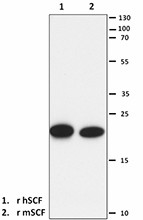
-

Recombinant human SCF (lane 1, 50 ng) and mouse SCF (lane 2, 50 ng) were resolved by electrophoresis, transferred to nitrocellulose, and probed with purified monoclonal anti-human SCF (clone L061D3) antibody. Proteins were visualized using a goat anti-mouse-IgG secondary antibody conjugated to HRP (cat#405306) and chemiluminescence detection.
| Cat # | Size | Price | Quantity Check Availability | Save | ||
|---|---|---|---|---|---|---|
| 662502 | 100 µg | £85 | ||||
Stem Cell Factor (SCF) is initially synthesized as membrane-bound forms of 248 or 220 amino acids, depending on the alternative splicing of exon 6. The 248 amino acid form contains a proteolytic cleavage site encoded by exon 6, and it is cleaved from the cell to release an active soluble protein of 165 amino acid residues. Soluble SCF is glycosylated at both N-linked and O-linked sites. MMP-9 plays a physiological role in SCF release from the membrane, and this action plays a significant role in differentiating and mobilizing stem and progenitor cells from the bone marrow. SCF increases the proliferation of myeloid and lymphoid hematopoietic progenitors in bone marrow cultures. SCF/c-kit interaction in mast cells results in mast cell degranulation that induces the release of mediators, such as histamine and inflammatory cytokines and chemokines. Also, activation of c-kit in dendritic cells regulates T helper cell differentiation and allergic asthma. In addition, SCF plays an important role in revascularization of ischemic limbs. Ischemia induces plasma elevation of SCF, thrombopoietin (TPO), erythropoietin (EPO), and GM-CSF albeit at lower levels. SCF and TPO induce the release of CXCL12 from platelets, which increase CXCL12 levels in plasma. This results in an extensive mobilization of CXCR4+VEGFR1+ cells (hemangiocytes) that accelerate revascularization of the ischemic limbs. SCF binds to its receptor c-kit, which belongs to the type III tyrosine kinase family whose members include receptors for M-CSF and PDGF.
Product DetailsProduct Details
- Verified Reactivity
- Human, Mouse
- Antibody Type
- Monoclonal
- Host Species
- Mouse
- Immunogen
- Recombinant human SCF
- Formulation
- Phosphate-buffered solution, pH 7.2, containing 0.09% sodium azide.
- Preparation
- The antibody was purified by affinity chromatography.
- Concentration
- 0.5 mg/ml
- Storage & Handling
- The antibody solution should be stored undiluted between 2°C and 8°C.
- Application
-
WB - Quality tested
- Recommended Usage
-
Each lot of this antibody is quality control tested by Western blotting. For Western blotting, the suggested use of this reagent is 1.0 - 2.0 µg per ml. It is recommended that the reagent be titrated for optimal performance for each application.
- RRID
-
AB_2564302 (BioLegend Cat. No. 662502)
Antigen Details
- Structure
- Homodimer (non-covalently linked).
- Distribution
- Cytoplasm and cytoskeleton.
- Function
- Stem Cell Factor (SCF) plays a role in the regulation of cell proliferation, melanocyte differentiation, innate immune response, hematopoiesis, stem cell maintenance, mast cell development, migration, and function. Binding of SCF to c-Kit leads to the activation of PI3 kinase, Src kinase, and several signaling pathways including JAK/STAT pathway (activation of STATs) and Ras/Erk pathway (transmit signals through adaptor protein Grb2).
- Interaction
- Mast cells, natural killer cells, dendritic cells, eosinophils, epithelial cells, endothelial cells, melanocytes, germ cells, cholangiocytes, platelets, myeloid leukaemia cells, and intestinal cells of Cajal.
- Ligand/Receptor
- c-kit (CD117)
- Biology Area
- Angiogenesis, Cell Biology, Immunology, Signal Transduction, Stem Cells
- Molecular Family
- Cytokines/Chemokines, Growth Factors
- Antigen References
-
1. Lu HS, et al. 1996. J. Biol. Chem. 271:11309.
2. Heissig B, et al. 2002. Cell 109:625.
3. Ronnstrand L. 2004. Cell Mol. Life Sci. 61:19-20.
4. Jin DK, et al. 2006. Nat. Med. 12:557.
5. Krishnamoorthy N, et al. 2008. Nat. Med. 14:565.
6. Ray P, et al. 2010. Ann. N. Y. Acad. Sci. 1183:104. - Gene ID
- 4254 View all products for this Gene ID
- UniProt
- View information about SCF on UniProt.org
Related FAQs
Other Formats
View All SCF Reagents Request Custom Conjugation| Description | Clone | Applications |
|---|---|---|
| Purified anti-SCF | L061D3 | WB |
Customers Also Purchased
Compare Data Across All Formats
This data display is provided for general comparisons between formats.
Your actual data may vary due to variations in samples, target cells, instruments and their settings, staining conditions, and other factors.
If you need assistance with selecting the best format contact our expert technical support team.
-
Purified anti-SCF
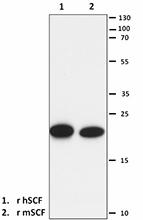
Recombinant human SCF (lane 1, 50 ng) and mouse SCF (lane 2,...
 Login / Register
Login / Register 




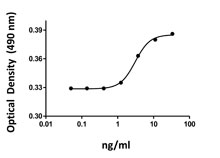
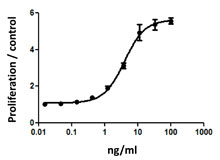
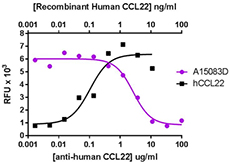




Follow Us